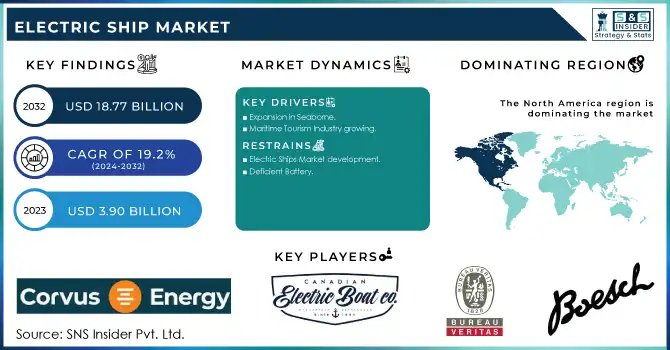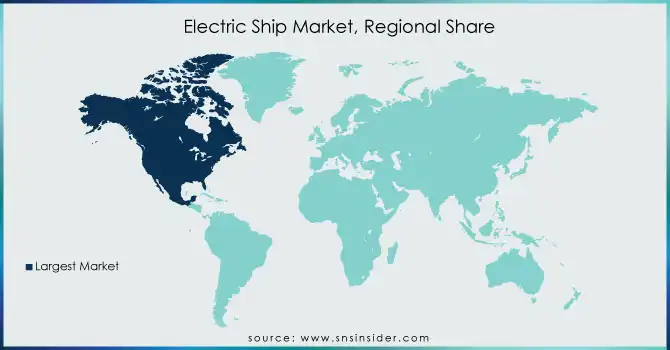Electric Ship Market Report Scope & Overview:
The Electric Ship Market size was valued at USD 3.90 billion in 2023 and is projected to reach USD 18.77 billion by 2032, growing at an impressive CAGR of 19.2% during the forecast period of 2024-2032.

To get more information on Electric Ship Market - Request Free Sample Report
Various reasons are driving the market, including an increase in the conversion of propulsion systems in passenger vessels, increased seaborne trade around the globe, and developing marine tourist industry. The growing commercial marine sector in many nations throughout various regions, together with the increased need for commercial boats, will fuel the demand for electric ships. Commercial vessels are becoming an important element of the electric ship sector, with countries such as the United States, China, Norway, Greece, and others investing extensively in commercial electric shipping operations.
MARKET DYNAMICS
KEY DRIVERS
-
Expansion in Seaborne
-
Maritime Tourism Industry growing
-
Electric Ships development
RESTRAINTS
-
limited range.
-
Electric Ships Market development
-
Slow charging
-
Deficient battery
OPPORTUNITIES:
-
renewable energy utilization
-
Hybrid propulsion technology
-
Fuel cells
CHALLENGES
-
Country’s major supply chain
-
Production dependent
-
Failure to maintain vessels
-
Operational failure
THE IMPACT OF COVID-19
The COVID-19 pandemic has forced original equipment manufacturers and financial sponsors to postpone financing for revolutionary ventures such as autonomous vessel operations. Furthermore, the disturbing impact on the inventory of materials for battery frameworks has long been a source of concern. The vast majority of raw materials, such as cobalt, nickel, and lithium, are imported from Japan and China. Nonetheless, some countries are completely shut down due to the epidemic. However, because the issue is not under control, the Electric Ships Market is likely to expand in a post-covid space.
KEY MARKET SEGMENTATION
By Range
-
<50Km
-
50-100Km
-
101-1000Km
-
>1,000Km
By Power Source
-
Electric
-
Hybrid
By System
-
Power conversion
-
Power generation
-
Power distribution
By Tonnage
-
<500DWT
-
500-5,000DWT
-
5,001-15,000DWT
-
>15,000DWT
By Operation
-
Manned
-
Autonomous
By Platform
-
Commercial
-
Defense
By End-Use
-
Line fit
-
Retrofit
Need any customization research on Electric Ship Market - Enquiry Now
REGIONAL ANALYSIS
According to a regional analysis report, the US Navy is monitoring the Electric Ships Market in North America with strategic equipment. Rely on the development of the Electric Ships Market during the research period. In addition, the presence of major energy producers, such as Corvus Energy, facilitates market development in North America. Europe dominated the Electric Ships Industry in 2020. This pattern is expected to be maintained during speculation due to the business of prominent players, such as AKASOL AG, BAE Systems, EST-Floattech, KONGSBERG, and Siemens to develop electric vessels.
The Electric Ships Asia-Pacific Market in the region is expected to register the highest CAGR in the limited period. Increasing defense use in India and China as well as the growing interest in new and improved marine vessels is driving the development of the local market. Increased defense spending in Saudi Arabia, the UAE, and Israel is driving the development of the business sector in the Middle East and Africa.

REGIONAL COVERAGE
North America
-
USA
-
Canada
-
Mexico
Europe
-
Germany
-
UK
-
France
-
Italy
-
Spain
-
The Netherlands
-
Rest of Europe
Asia-Pacific
-
Japan
-
South Korea
-
China
-
India
-
Australia
-
Rest of Asia-Pacific
The Middle East & Africa
-
Israel
-
UAE
-
South Africa
-
Rest of Middle East & Africa
Latin America
-
Brazil
-
Argentina
-
Rest of Latin America
KEY PLAYERS
The Key Players are Boesch Motorboote AG, Bureau Veritas, Canadian Electric Boat Company, Corvus Energy, Baltic Workboats AS, VARD AS, TRITON, Electrovaya, KONGSBERG, General Dynamics Electric Boat, Duffy Electric Boat Company, Yara & Other Players.
| Report Attributes | Details |
|---|---|
| Market Size in 2023 | US$ 3.90 Billion |
| Market Size by 2032 | US$ 18.77 Billion |
| CAGR | CAGR of 19.2% From 2024 to 2032 |
| Base Year | 2023 |
| Forecast Period | 2024-2032 |
| Historical Data | 2020-2021 |
| Report Scope & Coverage | Market Size, Segments Analysis, Competitive Landscape, Regional Analysis, DROC & SWOT Analysis, Forecast Outlook |
| Key Segments | • By End-Use (Line fit, Retrofit) • By Range (<50Km, 50-100Km, 101-1000Km, >1,000Km) • By Power Source (Electric, Hybrid) • By System (Energy storage, Power conversion, Power generation, Power distribution) • By Tonnage (<500DWT, 500-5,000DWT, 5,001-15,000DWT, >15,000DWT) • By Operation (Manned, Autonomous) • By Platform (Commercial, Defense) |
| Regional Analysis/Coverage | North America (USA, Canada, Mexico), Europe (Germany, UK, France, Italy, Spain, Netherlands, Rest of Europe), Asia-Pacific (Japan, South Korea, China, India, Australia, Rest of Asia-Pacific), The Middle East & Africa (Israel, UAE, South Africa, Rest of Middle East & Africa), Latin America (Brazil, Argentina, Rest of Latin America) |
| Company Profiles | Boesch Motorboote AG, Bureau Veritas, Canadian Electric Boat Company, Corvus Energy, Baltic Workboats AS, VARD AS, TRITON, Electrovaya, KONGSBERG, General Dynamics Electric Boat, Duffy Electric Boat Company, Yara |
| Key Drivers | • Environment pollution control. • Carbon-dioxide emissions. |
| RESTRAINTS | • Low energy density of batteries. • Time Consuming |

